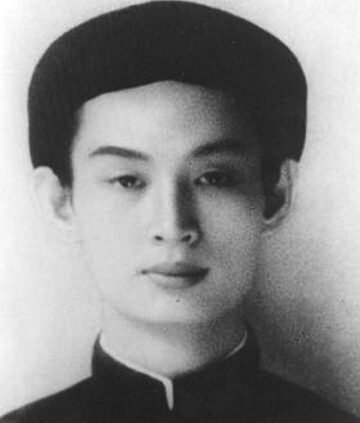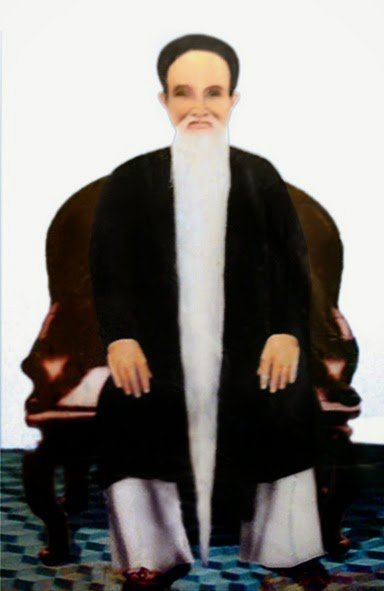Thất Sơn
Bảy Núi (Vietnamese: [ɓa᷉ːj nǔj], Chữ Nôm: 罷𡶀, seven mountains), also known by the Sino-Vietnamese version Thất Sơn (Vietnamese: [tʰə́k ʂəːŋ], Chữ Hán: 七山), is a range of small mountains located in the Tri Tôn and Tịnh Biên districts in Vietnam's An Giang Province, very close to the Cambodian border. The 710-metre Thiên Cấm Sơn...
The Master of the Jewel Mountain
VENERABLE MASTER BỬU SƠN: He is known as the Buddha Master of Tây An with the four words Bửu Sơn Kỳ Hương, which is the name of his sect. The Buddha Master was born in Tòng Sơn village, near Cái Tàu Thượng canal. Today, this area is Mỹ An Hưng commune, Sa Đéc province (southern...
Thiện Căn
Thiện căn (tiếng Phạn: Kuśala-mūla) là một thuật ngữ Phật giáo, có nghĩa là bản chất tốt hay tính cách tốt, ám chỉ gốc rễ có thể sản sinh ra thiện pháp. Suy nghĩ và hành vi có thể làm tăng trưởng thiện pháp (Kuśala) ví như rễ cây (mūla), nên được gọi là thiện...
Thiên Tào
Chỉ các dinh thư trên trời nơi các quan làm việc Tiếng Trung: 天曹
Third International
The Communist International, abbreviated as Comintern and also known as the Third International, was a political international which existed from 1919 to 1943 and advocated world communism. Emerging from the collapse of the Second International during World War I, the Comintern was founded in March 1919 at a congress in Moscow convened by Vladimir Lenin and the Russian Communist Party (Bolsheviks) (RCP), which aimed to create a new international body committed...
Third International
Quốc tế Cộng sản, còn gọi là Quốc tế III hay Đệ tam Quốc tế, là một tổ chức chính trị cực tả theo đường lối chủ nghĩa Marx-Lenin. Tổ chức được thành lập vào tháng 3 năm 1919 ở Moskva và giải tán vào năm 1943. Cương lĩnh hoạt động của Quốc tế Cộng sản là đấu tranh lật đổ chủ...
Tiéng Việt hiện đại
Chữ Quốc ngữ là bộ chữ Latinh hiện đang được sử dụng làm chữ viết chính của tiếng Việt hiện nay.[1] Chữ Quốc ngữ được các tu sĩ Dòng Tên Bồ Đào Nha và Ý[2][3] tạo ra và cải tiến từ bảng chữ cái và ghép âm dựa theo quy tắc chính tả của tiếng Bồ Đào Nha[2] và một chút tiếng Ý.[4] Sau cuộc chỉnh lý cuối thế kỷ 18,...
Lão Giáo
Taoism or Daoism (/ˈtaʊ.ɪzəm/ ⓘ, /ˈdaʊ.ɪzəm/ ⓘ) is a philosophical and religious tradition indigenous to China, emphasizing harmony with the Tao 道 (Chinese: 道; pinyin: dào, pronounced (IPA): /tɑʊ̯/ (Chineseⓘ)). With a range of meaning in Chinese philosophy, translations of Tao include 'way', 'road', 'path', or 'technique', generally understood in the Taoist sense as an enigmatic process of transformation ultimately underlying reality.[2][3] Taoist thought has informed the development of various practices...
Morality
By definition, the Tao (or Dao) is a Chinese concept meaning "the Way," representing the fundamental, unnamable source and principle of the universe in philosophies like Taoism. It can be understood as the natural order of the cosmos, the path of virtuous living, and the energetic flow (chi) that underlies all existence. While difficult to...
Núi Tà Lơn
Địa danh Núi Tà Lơn, hay Bokor Mountains, là Rặng Núi có nhiều truyền thuyết cho rằng đó là nơi linh thiêng bậc nhất ở Kampuchea đối với người Việt. Núi Tà Lơn (người Khmer gọi là núi Bokor) cách thị xã Kampot (thuộc tỉnh Kampot) khoảng 10 km về hướng Tây Nam. Đây là nơi hành hương, tham quan và vui chơi của...


